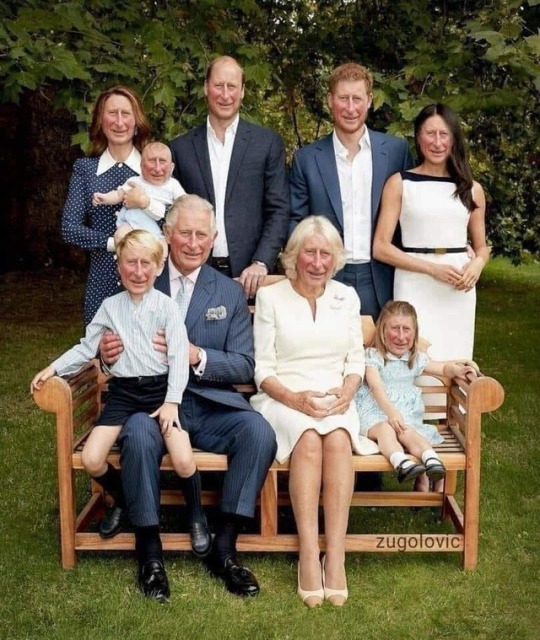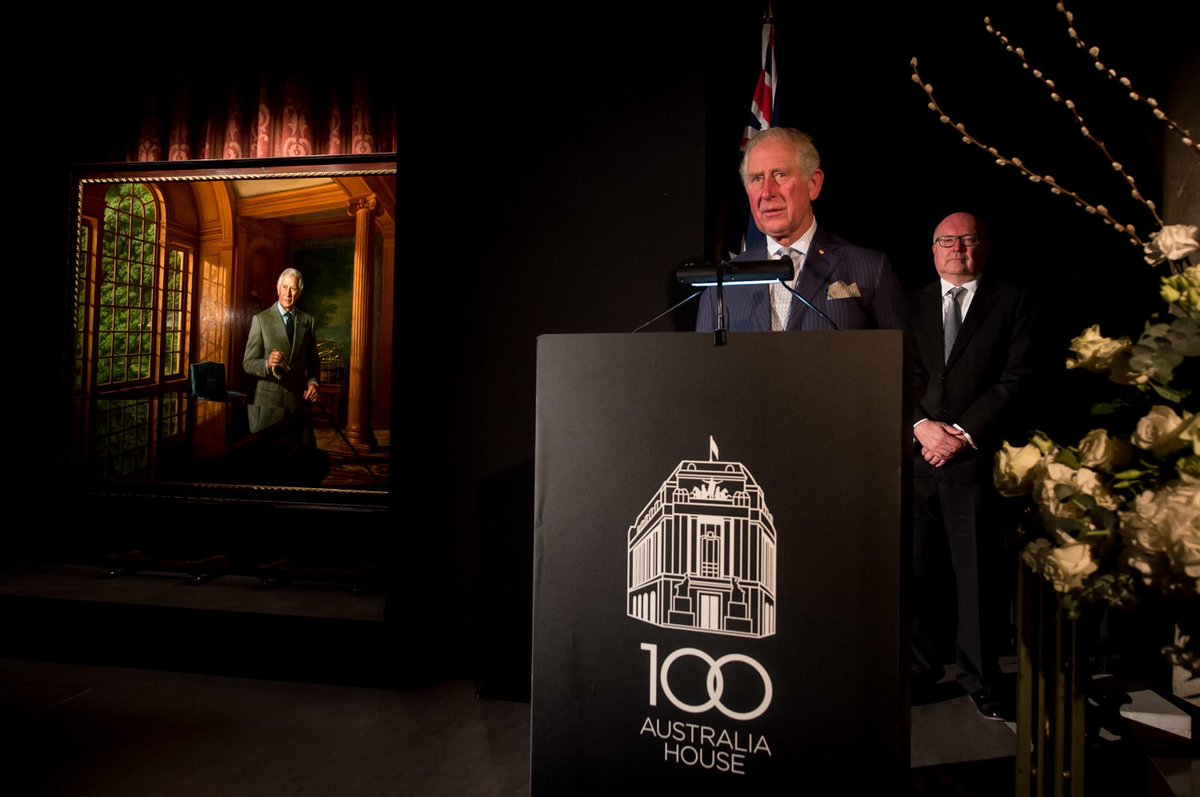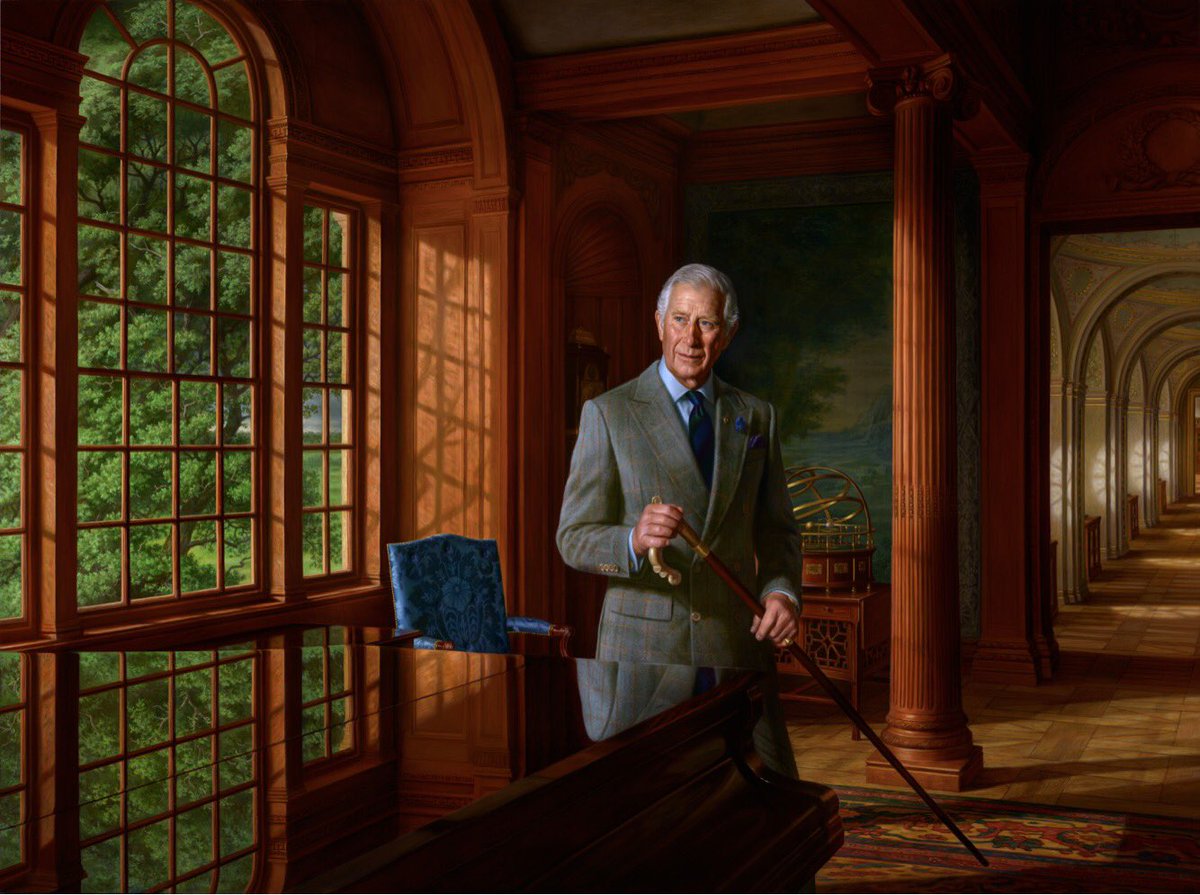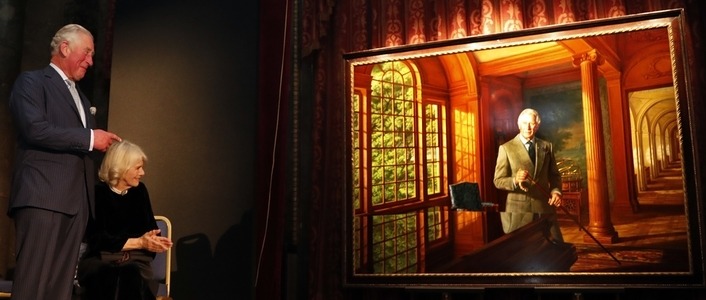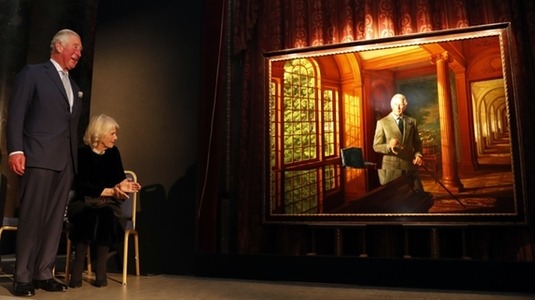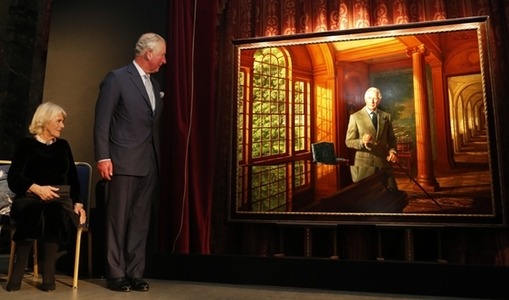Navigation
Instalar el app
How to install the app on iOS
Follow along with the video below to see how to install our site as a web app on your home screen.
Se debe tener en cuenta: This feature may not be available in some browsers.
Más Opciones
Estás usando un navegador obsoleto. No se pueden mostrar estos u otros sitios web correctamente.
Se debe actualizar o usar un navegador alternativo.
Se debe actualizar o usar un navegador alternativo.
Celebraciones por el 70 cumpleaños del Príncipe Charles. 2018
- AutorPrincess Kate
- Fecha de inicio
El telefono es lo mejor, primero ni habia me fijado que era un "escritório", pense que el maletin fuese para sus pinceles y material de pintura. Entoces han dicho lo del escritório, fue mirar novamente la foto y el telefono!!! Imaginate los empleados montando el escritório, cargando y conectando el equipamento de los 80 y el secretário transferindo las llamadas desde la oficina, 'alteza, ... aguarda en la linea 2'.Lo cierto es que la Reina, tampoco creo que utilice dispositivos móviles; todo lo hacen a lápiz y tienen secretarios que hacen todo el trabajo o la gran mayoría creo yo.
Recuerdo un documental de Albert de Mónaco, tampoco usa ningún tipo de dispositivo móvil para trabajar, todo eran papeles y lápices.
Demás está decir, que creo que todo es de utilería, para la foto; si no para que tanto secretario/asistente? Y ese teléfono enorme, me recuerda a la serie de Pablo Escobar (el narcotraficante colombiano)
- Registrado
- 24 Jun 2014
- Mensajes
- 3.309
- Calificaciones
- 16.046
El telefono es lo mejor, primero ni habia me fijado que era un "escritório", pense que el maletin fuese para sus pinceles y material de pintura. Entoces han dicho lo del escritório, fue mirar novamente la foto y el telefono!!! Imaginate los empleados montando el escritório, cargando y conectando el equipamento de los 80 y el secretário transferindo las llamadas desde la oficina, 'alteza, ... aguarda en la linea 2'.

Viendo la oficina móvil, parece que ni hiciera realmente nada, más que aparecerse en los eventos.
Dónde está su laptop, tablet o móvil?
Sólo lee documentos en papel? Dónde están?
En este caso parece estar leyendo los documentos de la caja verde de despacho.
Me parece natural que algunas actividades las lleve a cabo sin la oficina completa a cuestas.
Yo a veces salgo a trabajar a mi jardín solo con la tablet y el móvil, porque me basta para una cierta tarea.
En otras ocasiones uno necesita todos los dispositivos y documentos de su oficina y no queda más remedio que trabajar en ella.
Por otra parte, como comentó @samchispas , es posible que todo lo relativo a computadoras y dispositivos móviles lo deje para su staff.
A Harry casi no se nota el cambio.HAHAAHAHHAHAHAHAHAHA
HAHAAHAHHAHAHAHAHAHA
A Harry casi no se nota el cambio.
Iba a escribir lo mismo. Si se le tapa a Harry de la mitad de la nariz para abajo, no se nota el cambio, porque él heredó los ojos juntos de su padre.
- Registrado
- 23 Feb 2007
- Mensajes
- 9.843
- Calificaciones
- 27.615
@HAAKON, has tenido novedades de la carta de agradecimiento del príncipe por la que le enviaste por su cumpleaños?
Es muy pronto tal vez. No dejes de avisarnos, por favor!
Es muy pronto tal vez. No dejes de avisarnos, por favor!
- Registrado
- 26 Ago 2013
- Mensajes
- 22.640
- Calificaciones
- 137.631
Rebel Prince by Tom Bower review – is Charles the best argument for a republic?
The Prince emerges from this highly negative biography as vain, cold and out of touch. But it is only a partial account of his life and its contexts
Bee Wilson
Wed 28 Mar 2018 07.29 BSTLast modified on Sat 31 Mar 2018 00.10 BST

‘Nobody knows what utter hell it is to be the Prince of Wales’ … Prince Charles. Photograph: Tim Rooke/Rex Features
“On the eve of his sixtieth birthday,” Tom Bower writes in his unauthorised biography of the Prince of Wales, “Charles overtook his great-great-grandfather Edward VII as the longest-waiting heir to the British throne.” That was nine years ago and Charles is still waiting to start the job he was supposedly born to do. He was widely mocked for saying, in 2004, that “Nobody knows what utter hell it is to be the Prince of Wales” – a remark that, like so many of his utterances lacks any sense of perspective about the struggles of ordinary people. Millions would happily suffer the “hell” of living in multiple palaces and going on skiing holidays to Klosters.
Yet it remains true that none of us can imagine how psychologically weird his situation must feel. The more years that elapse before he becomes King Charles, the more implausible the whole proposition of Charles as monarch has come to seem – perhaps even to Charles himself. “Who are you?” he was once asked by a child, in an encounter captured on film for a documentary about his life presented by Jonathan Dimbleby. “I wish I knew,” was his reply.
Still, official preparations have been made for Charles’s accession and coronation, including plans by the Royal Mint for new coins with his face on them. According to Bower, Charles complicated the task with difficult requests. He was unhappy with the initial portrait the Mint came up with, thinking it made him look too bald and too old. “He demanded,” Bower writes, “that he should be shown with a full head of hair, and considerably younger.” Another demand, according to this book, was that Charles made it known that he preferred the look of the left profile of his face for the coin “rather than the conventional right-hand side”.
In contrast to his wise and frugal mother, Charles is known for Marie Antoinette-ish demands such as bringing his own crockery, whiskey and supply of organic food when invited somewhere as a guest. In Bower’s pen portrait, the prince is profligate and short-tempered, autocratic and selfish, he was cruel and contemptuous towards his former wife, Diana, when she was alive; he is emotionally cold to his siblings and sons, quick to take offence and slow to notice when he is causing it.
But then I looked up the conventions for British coinage. It turns out that since the reign of James II, the tradition is that each monarch faces the opposite way from his or her predecessor. Our current queen faces right. Charles therefore should face left according to tradition, regardless of whether he happens to believe that is also his more handsome side. This might be a tiny point, but it made me query how many of Bower’s other disclosures I could fully trust. His book, which seems prodigiously thorough in its research, is largely based on 120 interviews with people involved with the royal family, most of whom did not want to speak on the record. There is thus no way a reader can follow up most of his sources, or know whether the anonymous voices cited ever said anything more positive about Charles along with all the criticism.

Unasked-for fame … the Queen and Prince of Wales at the House of Lords last year. Photograph: Carl Court/Getty Images
It’s not that I doubt that most of the entertaining stories about his shortcomings are true. Take the clingfilm anecdote, which has already done the rounds. Bower reveals that Charles once “shrieked” at the sight of some salads and cold meat left on the sideboard at Clarence House. “What’s this?” he asked his wife Camilla. “It’s clingfilm, darling,” she replied. This story has the ring of truth to me, because I met Charles once, on a trip arranged for a group of food writers to experience the organic wonders at Home Farm in Highgrove, a few years ago. When it was my turn to talk to the prince in a small group, he confided affably how “ghastly” it was that so many people in Britain bought food in plastic wrapping. I muttered something about the fact that each pack of the prince’s own Duchy Originals shortbreads actually contained two separate plastic enclosures. Why wasn’t this ghastly too? He looked utterly incredulous – whether at the thought of the plastic sullying his biscuits or at my insolence I can’t say.
This is a gripping biography, but why has Bower decided to write a book that offers so few crumbs of sympathy or understanding to its subject? If you look up “CHARLES character” in the index, it lists only negative traits such as “sense of superiority”, “disloyalty” and “resentment of Diana”. Even Charles’s extensive charitable work for the Prince’s Trust is presented, one-sidedly, as negative: to this biographer it is above all a way “to improve his profile and buttress his self-belief”.
Geoffrey Robinson, Mohamed Al Fayed and Robert Maxwell and the politicians Tony Blair and Gordon Brown. He explains that what fascinates him about Charles is the way he “manipulated” the “levers of power” to secure his and Camilla’s survival when their relationship was under attack from the media and from his own family. Charles’s conduct, Bower insists, “has created a substantial number of victims, many of whom are saddened over how he acted, both in general and towards them”.
He depicts Charles as someone who can’t bear criticism and who is mean-spirited to many of his employees while favouring his former valet Michael Fawcett – who was supposedly once the squeezer of the royal toothpaste and was said by Charles to be the one person he couldn’t do without. After Fawcett was forced to leave Charles’s service for bullying other members of staff, Camilla successfully pleaded for him to be reinstated, and some of the staff who had complained about the bullying were fired.
Perhaps Charles is as thoroughly malign a person as Bower depicts him. Perhaps not. Either way, it would be useful to have more context about the influences that forged his complex personality. Unlike the subjects of most of Bower’s earlier biographies, who clawed their way up the ladder, Charles was born in the glare of unasked-for fame. “The happy couple are now in the winner’s enclosure,” the Queen remarked in her speech marking the long-delayed wedding of Charles and Camilla. But he cannot “win” his final prize until her death. Such a predicament might make anyone a bit crazy. By choosing to focus his biography only on the most recent 20 years of Charles’s life, Bower leaves little room for his unhappy early experiences being sent to board at the spartan Gordonstoun against his will, as dramatised in series two of the Netflix drama The Crown. He also devotes scant room to considering the wider culture of the British royal family and the extent to which some of Charles’s dysfunctions might be symptomatic of the anachronistic morals of court life in general.
By the time you have read through the whole sorry exposé, the obvious thought is that one option for dealing with the prince’s inadequacies would be a British republic after the Queen’s death. Yet Bower insists in his introduction that he is a “committed monarchist”, who still wants Charles to become king and to “bequeath the throne in a healthy state to his son”. If true, this is a very odd book to have written.
Rebel Prince by Tom Bower review – is Charles the best argument for a republic? https://www.theguardian.com/books/2018/mar/28/rebel-prince-tom-bower-review?CMP=share_btn_tw
The Prince emerges from this highly negative biography as vain, cold and out of touch. But it is only a partial account of his life and its contexts
Bee Wilson
Wed 28 Mar 2018 07.29 BSTLast modified on Sat 31 Mar 2018 00.10 BST

‘Nobody knows what utter hell it is to be the Prince of Wales’ … Prince Charles. Photograph: Tim Rooke/Rex Features
“On the eve of his sixtieth birthday,” Tom Bower writes in his unauthorised biography of the Prince of Wales, “Charles overtook his great-great-grandfather Edward VII as the longest-waiting heir to the British throne.” That was nine years ago and Charles is still waiting to start the job he was supposedly born to do. He was widely mocked for saying, in 2004, that “Nobody knows what utter hell it is to be the Prince of Wales” – a remark that, like so many of his utterances lacks any sense of perspective about the struggles of ordinary people. Millions would happily suffer the “hell” of living in multiple palaces and going on skiing holidays to Klosters.
Yet it remains true that none of us can imagine how psychologically weird his situation must feel. The more years that elapse before he becomes King Charles, the more implausible the whole proposition of Charles as monarch has come to seem – perhaps even to Charles himself. “Who are you?” he was once asked by a child, in an encounter captured on film for a documentary about his life presented by Jonathan Dimbleby. “I wish I knew,” was his reply.
Still, official preparations have been made for Charles’s accession and coronation, including plans by the Royal Mint for new coins with his face on them. According to Bower, Charles complicated the task with difficult requests. He was unhappy with the initial portrait the Mint came up with, thinking it made him look too bald and too old. “He demanded,” Bower writes, “that he should be shown with a full head of hair, and considerably younger.” Another demand, according to this book, was that Charles made it known that he preferred the look of the left profile of his face for the coin “rather than the conventional right-hand side”.
In contrast to his wise and frugal mother, Charles is known for Marie Antoinette-ish demands such as bringing his own crockery, whiskey and supply of organic food when invited somewhere as a guest. In Bower’s pen portrait, the prince is profligate and short-tempered, autocratic and selfish, he was cruel and contemptuous towards his former wife, Diana, when she was alive; he is emotionally cold to his siblings and sons, quick to take offence and slow to notice when he is causing it.
But then I looked up the conventions for British coinage. It turns out that since the reign of James II, the tradition is that each monarch faces the opposite way from his or her predecessor. Our current queen faces right. Charles therefore should face left according to tradition, regardless of whether he happens to believe that is also his more handsome side. This might be a tiny point, but it made me query how many of Bower’s other disclosures I could fully trust. His book, which seems prodigiously thorough in its research, is largely based on 120 interviews with people involved with the royal family, most of whom did not want to speak on the record. There is thus no way a reader can follow up most of his sources, or know whether the anonymous voices cited ever said anything more positive about Charles along with all the criticism.
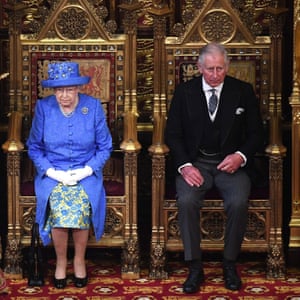
Unasked-for fame … the Queen and Prince of Wales at the House of Lords last year. Photograph: Carl Court/Getty Images
It’s not that I doubt that most of the entertaining stories about his shortcomings are true. Take the clingfilm anecdote, which has already done the rounds. Bower reveals that Charles once “shrieked” at the sight of some salads and cold meat left on the sideboard at Clarence House. “What’s this?” he asked his wife Camilla. “It’s clingfilm, darling,” she replied. This story has the ring of truth to me, because I met Charles once, on a trip arranged for a group of food writers to experience the organic wonders at Home Farm in Highgrove, a few years ago. When it was my turn to talk to the prince in a small group, he confided affably how “ghastly” it was that so many people in Britain bought food in plastic wrapping. I muttered something about the fact that each pack of the prince’s own Duchy Originals shortbreads actually contained two separate plastic enclosures. Why wasn’t this ghastly too? He looked utterly incredulous – whether at the thought of the plastic sullying his biscuits or at my insolence I can’t say.
This is a gripping biography, but why has Bower decided to write a book that offers so few crumbs of sympathy or understanding to its subject? If you look up “CHARLES character” in the index, it lists only negative traits such as “sense of superiority”, “disloyalty” and “resentment of Diana”. Even Charles’s extensive charitable work for the Prince’s Trust is presented, one-sidedly, as negative: to this biographer it is above all a way “to improve his profile and buttress his self-belief”.
Geoffrey Robinson, Mohamed Al Fayed and Robert Maxwell and the politicians Tony Blair and Gordon Brown. He explains that what fascinates him about Charles is the way he “manipulated” the “levers of power” to secure his and Camilla’s survival when their relationship was under attack from the media and from his own family. Charles’s conduct, Bower insists, “has created a substantial number of victims, many of whom are saddened over how he acted, both in general and towards them”.
He depicts Charles as someone who can’t bear criticism and who is mean-spirited to many of his employees while favouring his former valet Michael Fawcett – who was supposedly once the squeezer of the royal toothpaste and was said by Charles to be the one person he couldn’t do without. After Fawcett was forced to leave Charles’s service for bullying other members of staff, Camilla successfully pleaded for him to be reinstated, and some of the staff who had complained about the bullying were fired.
Perhaps Charles is as thoroughly malign a person as Bower depicts him. Perhaps not. Either way, it would be useful to have more context about the influences that forged his complex personality. Unlike the subjects of most of Bower’s earlier biographies, who clawed their way up the ladder, Charles was born in the glare of unasked-for fame. “The happy couple are now in the winner’s enclosure,” the Queen remarked in her speech marking the long-delayed wedding of Charles and Camilla. But he cannot “win” his final prize until her death. Such a predicament might make anyone a bit crazy. By choosing to focus his biography only on the most recent 20 years of Charles’s life, Bower leaves little room for his unhappy early experiences being sent to board at the spartan Gordonstoun against his will, as dramatised in series two of the Netflix drama The Crown. He also devotes scant room to considering the wider culture of the British royal family and the extent to which some of Charles’s dysfunctions might be symptomatic of the anachronistic morals of court life in general.
By the time you have read through the whole sorry exposé, the obvious thought is that one option for dealing with the prince’s inadequacies would be a British republic after the Queen’s death. Yet Bower insists in his introduction that he is a “committed monarchist”, who still wants Charles to become king and to “bequeath the throne in a healthy state to his son”. If true, this is a very odd book to have written.
Rebel Prince by Tom Bower review – is Charles the best argument for a republic? https://www.theguardian.com/books/2018/mar/28/rebel-prince-tom-bower-review?CMP=share_btn_tw
Última edición:
Temas Similares
- Respuestas
- 131
- Visitas
- 5K
- Respuestas
- 147
- Visitas
- 8K
- Respuestas
- 163
- Visitas
- 4K







